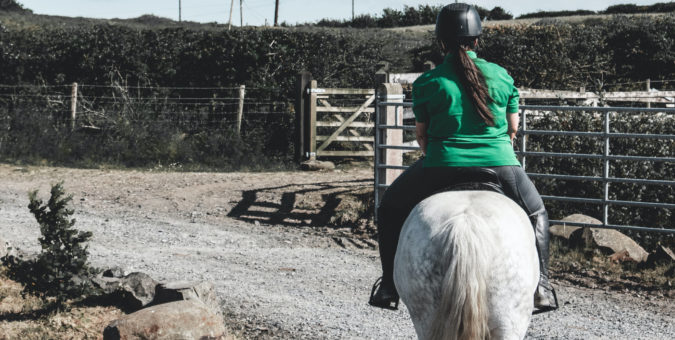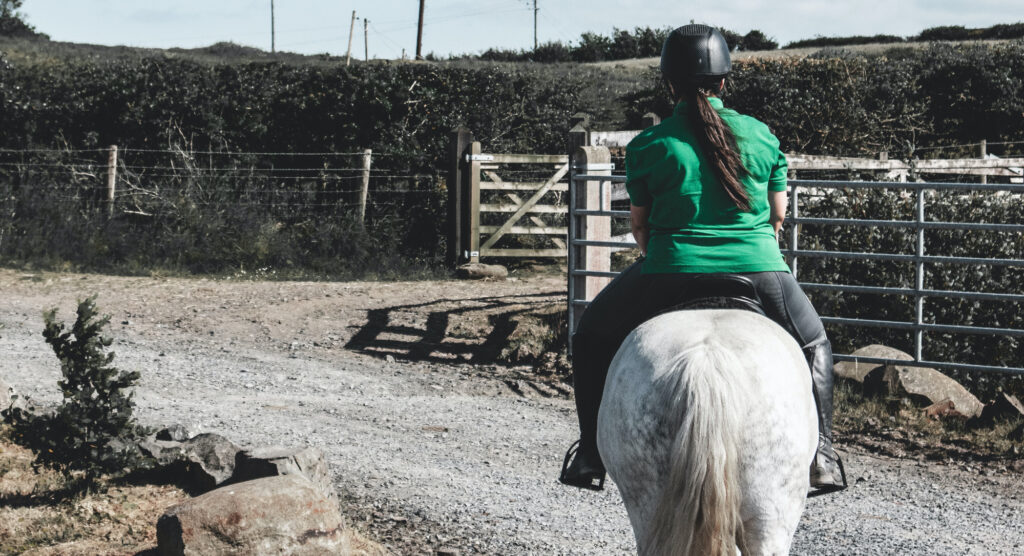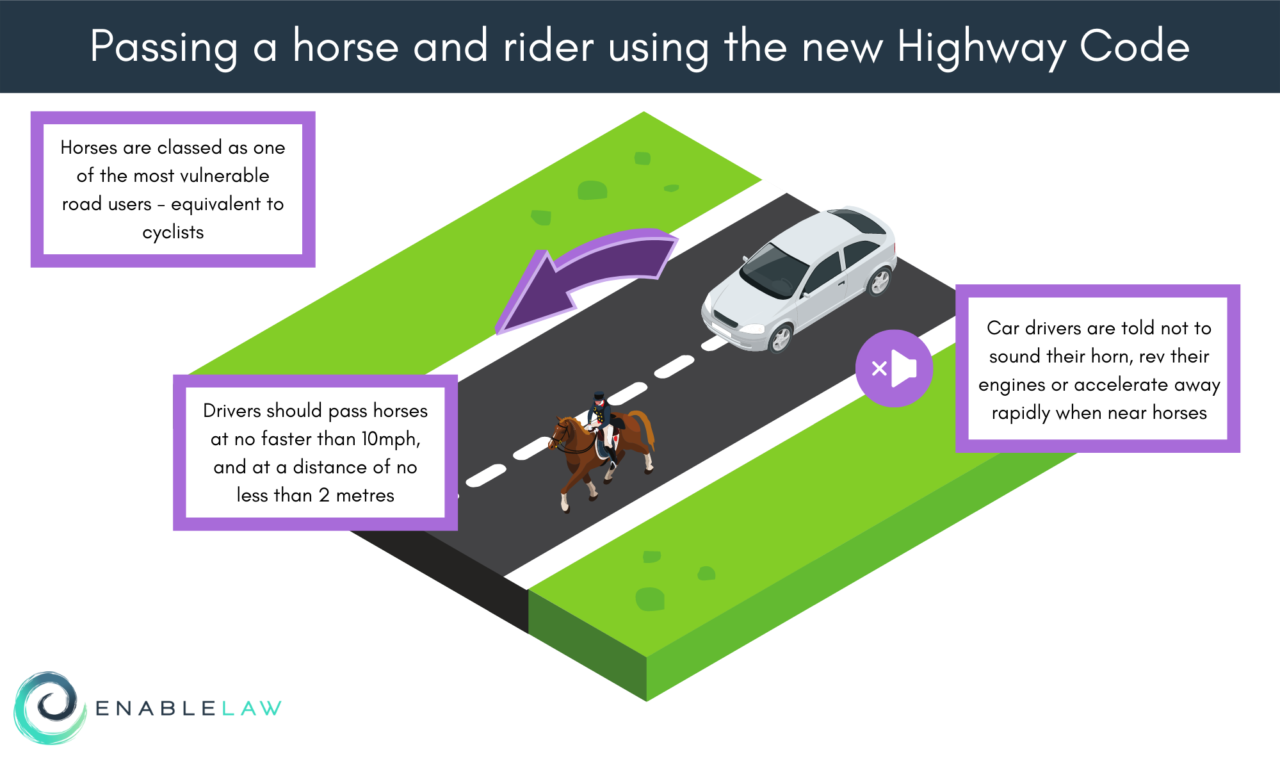
As a horse rider I was very interested to read the updated Highway Code and welcomed the recognition that horse riders are a vulnerable group of road users, equivalent in priority to cyclists.
Most horse riders have no wish to ride on the roads, However there is a real lack of off road options for us. Most fields are not available for riding – they are mainly privately owned and generally used for crops or grazing. More and more rural land is being taken over for housing. Even where there are bridleways, which are few and far between, we have to get to them somehow! We are not allowed to use cycle lanes, footpaths or pavements to keep off the road.
When we do venture out onto the roads, we try to keep to quieter times such as early on a Sunday morning when the roads will be less busy. Even so we will always encounter traffic. Most drivers are careful and considerate, and give us the time and space we need. However I would say that on any ride out we will always encounter at least one driver who speeds past getting far too close, which is scary for us as well as the horse.
What does the new Highway Code say about horse riders?
The new Highway Code is now much more specific as it requires car drivers to pass horses not just wide and slow, but at no more than 10mph and at a distance of no less than 2m, at rule 215.
It also comments on the unpredictability of horses, despite the best efforts of their riders, saying “remember there are three brains at work when you pass a horse: the rider’s, the driver’s and the horse’s. Do not forget that horses are flight animals and can move incredibly quickly when startled”.
Car drivers are told not to sound their horn, rev their engines or accelerate away rapidly.
What does the Highway Code say about riding a horse on the road?
It warns drivers that riders may ride in double file and recommends that they ride with others when riding a young or inexperienced horse – I know that some people have been worried in the past that if they have a young or inexperienced horse then they shouldn’t be on the road in the first place, and even avoided wearing hi-viz tabards which mention the fact, thinking wrongly that by doing so they are somehow admitting negligence.
Riding a horse near a road junction or roundabout
At junctions, car drivers are warned that horse riders may take a different line on the road than they might expect. On roundabouts, we are told to keep to the left all the way around until we come to the exit which we are using to leave the roundabout.
Horse riding on country roads
It warns that drivers should be prepared for horse riders on country roads and take extra care on bends. The same applies to other hazards in the countryside such as walkers where there is no pavement, slow moving tractors, mud on the road and many more. It is always vital to drive at a speed appropriate to how far you can see ahead of you.
Responsibilities as a horse rider under the Highway Code
Of course, horse riders still have the same responsibility to make themselves as visible as possible, wearing hi-viz clothing, and lights at night. You must make sure all your tack fits properly and is in good condition. Surprisingly, hard hats are not compulsory except for children under 14. Even so most riders would not dream of riding anywhere without a hard hat.
The Highway Code and New Forest ponies
For the New Forest, there is a new reference to the feral ponies there, and the consideration that needs to be given them. This is very welcome as every year we see too many pony and livestock deaths. The feral horses can step out into the road without warning and can be difficult to see in the dark. Even with the speed limit of 40mph, that can be too fast to avoid a collision.
Inform the British Horse Society about accidents and near-misses
Accidents involving horses can be traumatic for all involved. When horses are injured a vet will need to be called and I have seen too many reports of horses having to be put down at the scene, or later.
The BHS are keeping a database of incidents on the roads involving horses, and they invite anyone who has been involved in an incident, or a potential accident involving dangerous and careless drivers who put horses and riders at risk, to notify them.
Is it criminal to ignore the Highway Code?
Although failing to follow the Highway Code rules themselves is not necessarily a criminal offence which would lead to a prosecution, it can be used as evidence of negligence and can help to establish liability when an accident happens.
It will be interesting to see in the future how the updated Highway Code is interpreted alongside the Animals Act 1971 which has sometimes been interpreted in such a way that riders have been found liable when their horses spook on the road and an accident occurs.
What can you do after a road traffic accident involving a horse?
If you are unlucky enough to be involved in an accident then it is important that you speak to a solicitor who has specific expertise of claims involving horses, and can understand the ‘horsey’ issues involved. There really is no substitute for practical knowledge and experience.
Try to gather as much evidence as possible at the time or afterwards, such as driver and witness details, photos and video footage – hat cams are now very popular and the Police are very willing to look at footage, especially where it clearly shows the car registration. If there are injuries involved then call the Police, particularly if the driver doesn’t stop. If you have horse insurance then you may have access to a legal helpline or legal expenses insurance to pursue a claim against the driver. If not then please do speak to me, or another member of our team, about a ‘no win no fee’ arrangement.




















